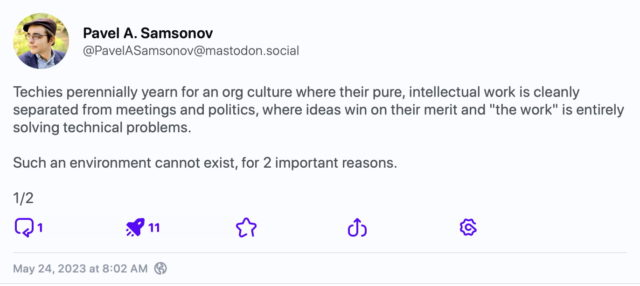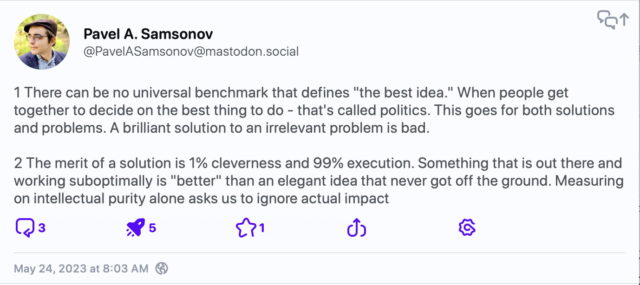Earlier this summer I played Firmament, the new puzzle game from Cyan, the creators of Myst.
I love these sorts of games, and I wrote about what I like about them a few years ago in the context of Zed. I enjoy a mix of puzzles, setting, and story, which Cyan has historically been good at providing. I backed Firmament on Kickstarter as soon as they announced they’d be doing a Mac version, having also backed their previous game, Obduction, which I enjoyed a lot, though I thought it had a few flaws.
Firmament modifies the traditional point-and-click interface with a device the player uses called an Adjunct, which they use to connect to sockets throughout the game which provides some additional flexibility in how the player interacts with the world. It also both makes it clearer what you can interact with, but it feels somewhat limiting since everything has some small variation of the same interface. I’ve seen it theorized that the Adjunct mechanic was created to make the VR experience of the game better or more consistent or something. I guess it’s possible, I dunno. Maybe that was a concern 4 years ago when they started making the game?
A spoiler-free review first, and then some further thoughts:
The setting for Firmament is that you wake up from long-term sleep and are greeted by the Mentor, who appears to be a ghost of your predecessor. They’ve woken you up and advise you from time to time. The world consists of three settings, an ice zone, a botanical garden, and a sulphur-based power plant, along with a central structure1 called The Swan. You travel between them via conveyance pods, and have two waves of tasks to accomplish on each world to get to the conclusion.
There are basically three sorts of things in these games that I dislike: Puzzles that are too hard (this is obviously subjective), having to walk back and forth a lot to solve a puzzle, and things that are hard to see. Firmament has a few spots where there were things I just couldn’t see and I had to use a walkthrough – a video one in one case – to figure out what I was missing. This is frustrating because it feels like I just was never going to figure it out on my own. The game does pretty well on the other two points, although there was one puzzle I didn’t so much figure out as stumble into the answer for. Better lucky than good, I guess?
The game’s weakness, I think, was its story. Since Cyan’s games are solo endeavors with little capability for you to interact with anyone in the game, they all take place in environments where the people who used to be there are gone, and finding out what happened to them is part of the adventure. Firmament feels pretty thin, here, as the Mentor and one other character are the only ones you learn much about. There were clearly more people around, but we learn very little about them. I think they could have threaded more characters and more events into the game and provided a richer story to explore. As it was, it definitely felt less sophisticated than Obduction.
(I’m inclined to think that the use of AI to assist in generating parts of the game are not really at fault as this article thinks they might be. I think they just didn’t spend enough time coming up with enough story to make it satisfying.)
I think the game took me about 15 hours to complete. I did run into one bug, but it turned out not to affect me in that puzzle. Other people have run into more serious bugs, but they’ve been fixing them. If you enjoy games like these, give this one a try, but temper your expectations, especially if story is your main interest.
A few more spoilery comments after the cut:
Continue reading “Firmament”

